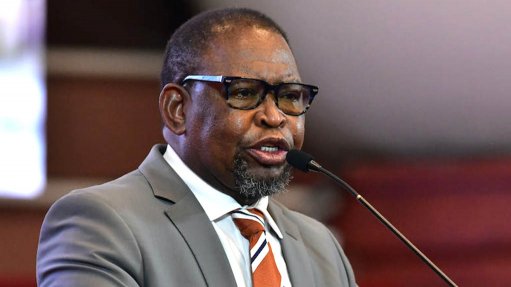Population register ‘clean up’ gets big slice of Home Affairs’ R6.6bn budget
Outlining the Department of Home Affair’s (DHA’s) objectives for the 2014/15 fiscal period, Home Affairs Minister Malusi Gigaba told Parliament on Tuesday that R4.9-billion of the department’s overarching R6.6-billion budget would be channeled to various departmental programmes, including the “cleaning up” of the country’s National Population Register (NPR).
During the tabling of the department’s yearly budget, Gigaba noted that the NPR continued, for historical reasons, to contain “significant inaccuracies”.
“Ensuring an accurate population record remains a daunting challenge in a country in which late registrations of birth remain a significant feature, resulting in significant breaches in, and pollution of, our NPR,” he commented.
The newly inducted Minister added that there had, however, been some improvement, with 64% of all births in the prior financial year having been registered within 30 days – a year-on-year improvement of 5%.
This followed the introduction of “live birth registration” systems at 391 hospitals and health facilities across the country – a process that would soon become the only way in which newborns could be registered.
“I intend ending all late registrations of birth (LRB) by the end of December 2015, after which all applications for LRB would go through an appeal and adjudication process. The timely registration of births must, and will soon be, the only way into the NPR,” he held.
SMART ID ROLL-OUT
Gigaba added that one of the department’s most “tangible” efforts to build a new national identity (ID) system was the ongoing introduction of the new smart ID card, which the DHA began rolling out in October 2013 in 70 designated countrywide offices.
“Thus far, over 300 000 cards have been issued and an additional 70 offices will have smart-ID card application capability by the end of this financial year, to support our roll-out target of 1.5-million cards,” he said, adding that the department was also investigating ways to leverage partnerships with the South African Post Office and banks to facilitate the roll-out.
SECURED BORDER MOVEMENT
The DHA would further channel a portion of its yearly budget to immigration security, after being tasked by Cabinet with the establishment of the Border Management Agency (BMA).
The BMA would be central to securing all land, air and maritime ports of entry and supporting the efforts of the South African National Defence Force to deal with the threats posed to, and the porousness of, South Africa’s national borders.
The department was currently undertaking a feasibility study to determine the practicalities of a future BMA, the findings and proposals of which would guide the legislative process.
“All relevant government departments are being engaged in an intergovernmental consultative process through a project management office and we hope to have the BMA established by the end of 2016,” Gigaba said.
The DHA had, meanwhile, upgraded infrastructure at 11 high-volume points of entry, including the Beit Bridge, between South Africa and Zimbabwe, and the Maseru Bridge, between South Africa and Lesotho.
It had also expanded the enhanced movement control system (MCS) to 13 additional points of entry.
“During the previous year, we facilitated the movement of 39-million travellers in and out of the republic, demonstrating that our ability to manage the flow of people in and out of the country is becoming increasingly efficient and robust,” said Gigaba.
In this regard, he drew attention to the new, largely unpopular immigration regulations which took effect on May 26, following amendments to the immigration legislation, which he claimed had grown outdated in the context of new complex challenges.
The regulations introduced a new visa regime for South Africa, outlining a clear distinction between short-stay visas and long-stay permanent residence permits.
It also stipulated that visa applications needed to be made by applicants in person, and those wanting to change the status of their visa could no longer do so in South Africa but had to do so at missions abroad.
“As well as facilitating the streamlining of our permitting regime, improving the administration of our visa issuance, and regulating human movement into and out of South Africa, the new regulations enhance our security by addressing areas of weakness, risk and abuse.
“We reject, with contempt, any suggestion that these regulations are part of an Afrophobic agenda to keep Africans or any nationality for that matter out of South Africa,” he asserted.
Gigaba also announced that South Africa was in the final stages of deliberations over the Zimbabwean Special Dispensation, which would expire in December, saying he was mindful of the anxiety among the Zimbabwean nationals in possession of this special permit issued in 2010.
This dispensation allowed Zimbabweans into South Africa under relaxed conditions, providing them with work, study or business permits and suspending their deportation.
“I shall announce my decision in August,” he advised.
Future immigration policy development, meanwhile, would focus on a framework to “better deal with” the economic migration of those posing as asylum seekers and take into consideration “current realities and future management perspectives”.
DEPARTMENTAL MODERNISATION
Meanwhile, describing the current DHA manual administrative system as “inefficient and outdated”, Gigaba explained that the department had embarked on a modernisation programme to secure, integrate and automate its systems, thus creating a paperless data environment.
Key to the modernisation project was the development of an integrated border management solution, which would include an e-visa and e-permit system, data clean-up of key immigration and civics systems, as well as the further roll-out of live-capture smart-ID card system to identified offices.
Working together with the South African Revenue Service (Sars), the department had successfully implemented the enhanced MCS in 58 ports of entry and had automated the live-capture for smart ID cards and passports in 70 offices nationwide.
Office infrastructure, as well as the technology used at the Government Printing Works (GPW) – which was now entirely self-funded – had also been upgraded.
The GPW, which was responsible for producing the smart ID cards on behalf of the DHA, had, since 2009, doubled its revenue to R757-million, with an envisaged two- or three-fold increase in revenue over the next five years.
GPW was midway through a five-year, R300-million programme to upgrade all printing machines, as well as the implementation of a multiyear renovation and relocation project.
“Thus far, the passport and smart ID card factory, and high-security printing division are operational with the passport, smart ID card and examination papers dispatch centre, coming on stream in 2015.
“In addition, over the coming few years, GPW plans to complete its transition from a government component into a State-owned enterprise,” Gigaba noted.
FILM AND PUBLICATIONS BOARD
The DHA would, meanwhile, maintain its oversight of the Film and Publications Board (FPB), which now used an online application system, enabling the body to release classification decisions within 24 hours.
The FPB had been allocated R79-million for the 2014/15 fiscal period.
In addition, to adapt to the growth of digital media, the board was exploring online distribution agreements with major content distributors, enabling the companies to classify on its behalf in accordance with its regulatory guidelines.
“The FPB continues to work with the DHA, Sars and South African Police Service and has recently destroyed more than 8 000 illegally distributed material in Komatipoort, in Mpumalanga,” said the Minister.
Gigaba concluded by noting that the Electoral Commission would receive R1.6-billion of the department’s yearly budget.
Comments
Announcements
What's On
Subscribe to improve your user experience...
Option 1 (equivalent of R125 a month):
Receive a weekly copy of Creamer Media's Engineering News & Mining Weekly magazine
(print copy for those in South Africa and e-magazine for those outside of South Africa)
Receive daily email newsletters
Access to full search results
Access archive of magazine back copies
Access to Projects in Progress
Access to ONE Research Report of your choice in PDF format
Option 2 (equivalent of R375 a month):
All benefits from Option 1
PLUS
Access to Creamer Media's Research Channel Africa for ALL Research Reports, in PDF format, on various industrial and mining sectors
including Electricity; Water; Energy Transition; Hydrogen; Roads, Rail and Ports; Coal; Gold; Platinum; Battery Metals; etc.
Already a subscriber?
Forgotten your password?
Receive weekly copy of Creamer Media's Engineering News & Mining Weekly magazine (print copy for those in South Africa and e-magazine for those outside of South Africa)
➕
Recieve daily email newsletters
➕
Access to full search results
➕
Access archive of magazine back copies
➕
Access to Projects in Progress
➕
Access to ONE Research Report of your choice in PDF format
RESEARCH CHANNEL AFRICA
R4500 (equivalent of R375 a month)
SUBSCRIBEAll benefits from Option 1
➕
Access to Creamer Media's Research Channel Africa for ALL Research Reports on various industrial and mining sectors, in PDF format, including on:
Electricity
➕
Water
➕
Energy Transition
➕
Hydrogen
➕
Roads, Rail and Ports
➕
Coal
➕
Gold
➕
Platinum
➕
Battery Metals
➕
etc.
Receive all benefits from Option 1 or Option 2 delivered to numerous people at your company
➕
Multiple User names and Passwords for simultaneous log-ins
➕
Intranet integration access to all in your organisation




















